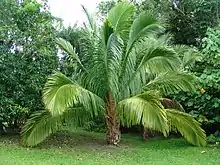| Beccariophoenix madagascariensis | |
|---|---|
 | |
| Scientific classification | |
| Kingdom: | Plantae |
| Clade: | Tracheophytes |
| Clade: | Angiosperms |
| Clade: | Monocots |
| Clade: | Commelinids |
| Order: | Arecales |
| Family: | Arecaceae |
| Genus: | Beccariophoenix |
| Species: | B. madagascariensis |
| Binomial name | |
| Beccariophoenix madagascariensis | |
Beccariophoenix madagascariensis, commonly known as the coastal beccariophoenix, is a species of flowering plant in the family Arecaceae. It is a large Coconut relative that is vulnerable in its habitat in Madagascar.
Range and habitat
Beccariophoenix madagascariensis is native to Madagascar's eastern rainforests, between Tolagnaro and Mantadia.[1]
It is found in humid lowland forest and mid-elevation humid montane forest from sea level to 1,200 meters elevation. It is found in forests with a slightly open canopy, typically on poor soils derived from white sand or on podzolized ridge tops.[1]
There are only three known populations, which are severely fragmented. There are an estimated 900 mature individual trees.[1]
Similar species
Beccariophoenix fenestralis was previously considered a variety of this species. It is quite different when a seedling, in having wide, mostly unsplit leaves, whereas B. madagascariensis has fully split, very stiff upright leaves when young.
Use
Young leaflets are used to make hats.[2]
References
- 1 2 3 4 Rakotoarinivo, M. & Dransfield, J. (2012). "Beccariophoenix madagascariensis". The IUCN Red List of Threatened Species. IUCN. 2012: e.T38448A2869148. doi:10.2305/IUCN.UK.2012.RLTS.T38448A2869148.en. Retrieved 13 January 2018.
- ↑ Dransfield, John; Beentje, Henk; Britt, Adam; Ranarivelo, Tianjanahary; Razafitsalama, Jérémie (2006). Field guide to the palms of Madagascar. Royal Botanic Gardens, Kew. pp. 162-3. ISBN 9781842461570
